21 Dec Elisa’s Story
This September, about six months months into the pandemic, the PIVOT team experienced the kind of story with a happy ending that everyone needed this year. A 6-year-old girl named Elisa, cared for by our clinical team since 2018, returned home to her parents in Madagascar healthier and happier than when they’d bid her farewell nine months prior, when they thought she’d be home from France in a matter of weeks.
Though the pandemic kept them apart longer than anticipated, Elisa’s time away became an essential component of her complicated journey through care and recovery.
When the PIVOT team met Elisa in 2018, it was clear that her case was special. The urgency to connect her with the services needed to address the benign tumor dominating the right side of her face was not born of an immediate threat to her wellbeing. But – knowing that the years to come the growing deformity would compromise her ability to breathe and eat – her case underscored the persisting disparities in access to lifesaving healthcare services across the globe.
As we carry forth our efforts to realize universal health coverage, sometimes we happen upon someone for whom doing “whatever it takes” means this kind of difference in the rest of their life. Over the course of this year, against the backdrop of the COVID-19 pandemic, Elisa’s exceptional story is one that was made possible only through the combined effort of many staff, partners, and supporters – the kind that embody compassion and inspire hope.
Read on for more about the extraordinary year that 2020 was for Elisa, and the network of caregivers who supported her journey from start to finish.
In July of 2014, Elisa came into this world as the first child to her loving parents, Vao and Prosper. Apart from what looked like a small bruise on her lower right cheek, she was as healthy a baby girl as any new parents could hope for. Over time, the bruise remained, but didn’t spark major concern until it started to grow, and her parents took notice that her teeth were coming in at notably slower pace on that side of her mouth than the other.
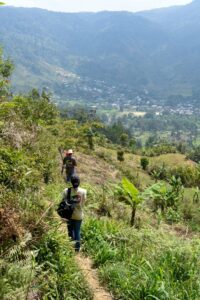
When Elisa was 8 months old, the couple walked her to a university hospital in Fianarantsoa, a facility located in the closest major city to Ifanadiana District and to which PIVOT now refers patients in need of specialized care (but were not active yet).
Though no treatment could be provided at the time of their 2015 visit, the doctors determined the growth to be benign and urged Vao and Prosper to return periodically so they could monitor its development as Elisa continued to grow. That day, they also learned of a new organization called PIVOT, which was just launching its partnership with the Ministry of Public Health (MOPH) to strengthen the public health system in Ifanadiana District and was establishing its headquarters in Ranomafana, about an hour’s drive from where they lived at that time.
By 2018, Vao and Prosper had welcomed a second child (a boy, Evariste) and relocated to Ranomafana in anticipation of needing more reliable access to healthcare for Elisa, who was now 4 years old (on the left, a shot of PIVOT staff on the walk to their new family home). Her parents knew that the growth on her face was a benign tumor, but it had grown so large that it malformed almost the entire left side of her face. Though it caused her minimal pain, it was impeding her ability to eat and speak, and she had started asking her parents why other children stared at her in school.
That July, when Elisa was running a fever, her father Prosper brought her to Ranomafana Health Center – their first encounter with PIVOT-supported services within Ifanadiana District’s public health system. After receiving a comprehensive health screening provided to all children under 5, the clinical team prescribed drugs which would quickly treat her fever, and immediately referred her to the district hospital. On the way there, Prosper noted that this was a significant journey away from home, unable to anticipate how much longer a journey lay ahead for his daughter.
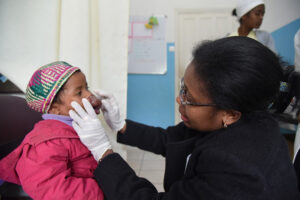
Elisa receives a comprehensive child health screening during her first visit to a PIVOT-supported facility in July of 2018.
It was immediately clear to hospital clinicians that Elisa’s case would at the very least need to be referred to the capital city of Antananarivo for maxillofacial surgery. But the stakes were high – Elisa stood to gain a lot from a successful surgery, but potentially even more to lose if the surgery went poorly. The PIVOT social team helped the family weigh the options to make their choice.
Ultimately, in late 2018, during a 3-month stay in the capital – a 10-hour drive from Ifanadiana District – with her mother Vao, Elisa was due to undergo a procedure that would aim to shrink the tumor. But the surgeons faced complications during preliminary stages of the operation, which led to heavy bleeding. Though her lips were reduced slightly in size, Elisa returned home in a great deal of pain she hadn’t had before, and grew resistant to eating due to the discomfort.
The family endured in this state for a bit over a year, hoping that Elisa’s healing would continue to improve. In the meantime, a task force of sorts was coming together across the PIVOT team, with staff from almost every department coming together in search of a better solution for the challenges Elisa was facing. Closely monitoring Elisa’s progress, they knew that the operation in Antananarivo had not made enough of an improvement to stop the tumor’s growth and looming threat of obstructing Elisa’s airway, and they were not going to stop until they found a solution.
By late 2019, PIVOT had forged a connection with FACE AU MONDE (or “Facing the World”), a French organization that specializes in connecting children with severe facial deformities from all over the world to the kind of care they need.
“When doctors working at the [Ifanadiana District] hospital explained to us that Elisa could have another operation and asked us if it was okay to send Elisa abroad, we accepted,” her mother Vao recalls. ”Despite the fact that those around us were reluctant about sending Elisa abroad, we did not hesitate. Even if it is hard for us to imagine being far from our home […], we kept in mind that this is the best for her! And we had complete confidence in PIVOT.”
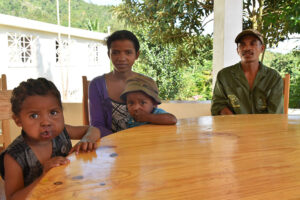
With her parents’ support, her departure scheduled for December 2019. By then, Elisa’s team was assembled:
A surgical team at Necker-Paris Children’s Hospital was on board to handle Elisa’s case. Miora, a PIVOT nurse and member of the ambulance referral team, accepted the responsibility of accompanying Elisa to France to care for her, having acquired a passport to leave Madagascar for the first time – this helped Elisa’s parents avoid the burden of leaving their livelihoods and young son behind in Madagascar.
A Paris-based couple – who had come to learn about and support PIVOT by way of their niece Mathilde, a PIVOT staff member – were preparing to open their home to Elisa and Miora for an 8-week stay in Paris. As parents (and recent empty nesters) of 5 grown children, Cécile and Régis (an HR executive and OBGYN, respectively) were enthusiastic about opening their home to guests over the two months ahead, which was estimated to be the length of time necessary for Elisa to undergo her procedure and recovery before she could safely return to Madagascar.
Elisa was excited for the trip, and boarded the plane without hesitation, eager to return home with a “new mouth.”
Upon arrival, Cécile and Régis describe Elisa as extremely timid. Because the 3 had very little language in common, Miora – the only one of the group completely fluent in both Malagasy and French – often served as de facto translator for the household, playing a central role in fostering a certain camaraderie among their short-term family unit as a result. From the moment Miora set foot on the plane out of Antananarivo, she held Elisa’s hand knowing she would need to be her unwavering companion until they returned home. Miora was not only to be Elisa’s full-time nurse and caregiver, with support and guidance from PIVOT’s social work team, a confidante and source of comfort. She quickly realized that she would add to that list translator, mediator, tutor, advocate. Standing in as a parental figure to Elisa, she also found herself providing things like technological and psychological support during video calls with Elisa’s family back home (new to everyone, but appreciated by all), which Vao and Prosper visited the PIVOT office to receive.
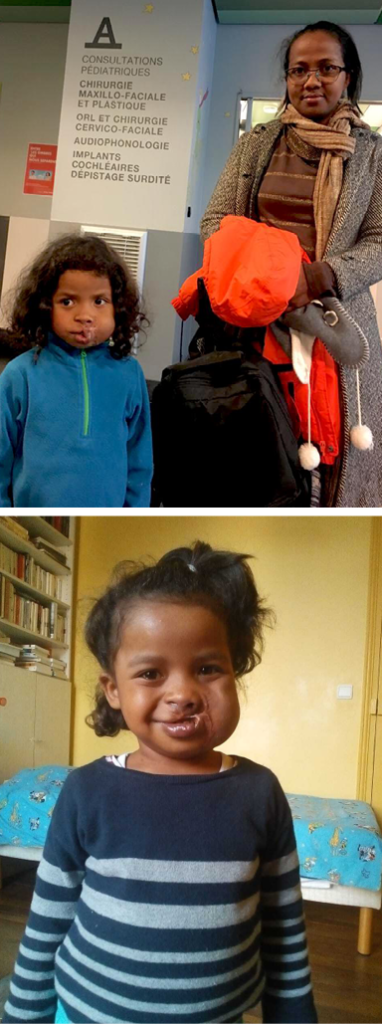
It wasn’t long before Elisa’s journey became complicated, when she had an allergic reaction to the anesthesia administered during the first leg of her care in January, sending her into anaphylactic shock. The doctors in France encountered some of the same challenges as those faced during her procedure back in Antanaranivo, and had to come up with a different approach. The complications that followed – including painful deterioration to the lining of her inner cheek and large canker sores – required Elisa to spend time in intensive care, followed by a prolonged period of healing punctuated by frequent follow-up visits.
The situation tacked an extra 6 weeks onto their original trip. It was during this stretch that Elisa’s prior enthusiasm for her journey waned. She also lost her interest in food. “Meals had become a hardship because she couldn’t eat without real pain,” Cecile recalls. So they adapted, procuring nutritious options Elisa could consume through a straw. All the while, Elisa wondered aloud why they were still in France if nothing more could be done to help her.
Thanks to the diligent care of Miora and her host family throughout recovery, the outcome of the first procedure eventually resulted in improvements to the tumor’s burden on Elisa’s eating and breathing. Despite this, by March, when Elisa was scheduled to return to Madagascar, the appearance of her face had actually worsened on the outside. With two months in France behind her, Elisa was now speaking openly (and in fluent French) with her host family. As she looked at her reflection in the mirror one day, she asked Cécile why she was going home now, with her mouth looking the same or worse than it had when she arrived. In an act of advocacy that she only recalls with humility, Cécile drafted a letter to the surgeons, pleading Elisa’s case for reconstructive surgery. Still, they knew that the possibility of extending their visas for this reason was a longshot, and kept their expectations low.
As fate would have it, by March the world was starting to come to terms with the gravity of the burgeoning COVID-19 pandemic, and Elisa and Miora would soon learn that returning to Madagascar wasn’t even an option. The country had closed its borders to all commercial travel soon after confirming its first case of COVID on March 20. Despite the unfortunate nature of the circumstances, Cécile and Régis were delighted to have them extend their stay.
The hospital had approved the procedure, and even offered to cover its costs. Back in Tana, Miora’s work responsibilities were covered by her colleagues on the clinical team. She managed to get her personal affairs in order to stay longer, though not knowing how much longer, having left in a hurry back in when it was determined that accompaniment for Elisa’s trip was needed and that she was the best person for the job.
Reflecting on their time together, Cécile fondly describes how Miora was “with Elisa 24 hours a day for 8 months, like a mother and a nurse, never showing any impatience, always gentle and available to Elisa, devoting many hours each day to making her ‘work’ on French, singing, writing, counting, playing, reading her stories, taking her for walks. This, all in addition to providing her with all the necessary care after the operations and liaising with Necker’s medical team, who were very impressed by her professionalism and affection for Elisa while both far away from their homes for so long.”
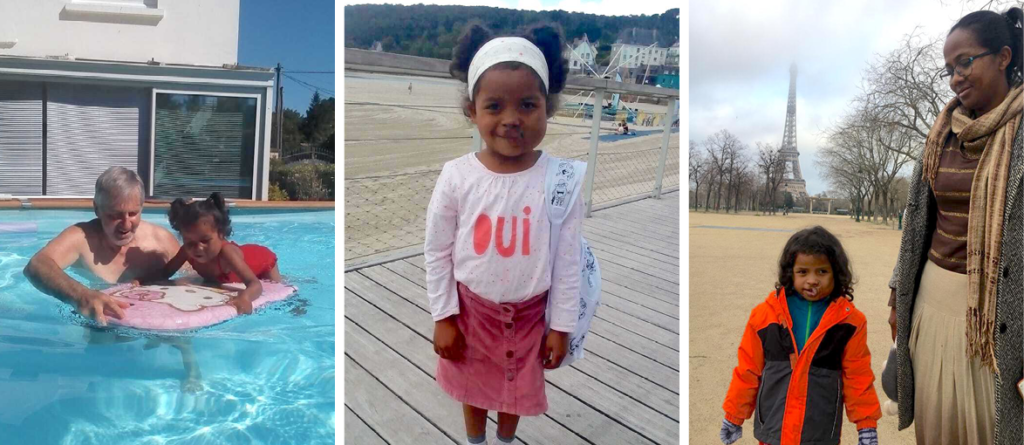
Elisa enjoys Paris through the seasons – swimming with Regis, sightseeing with Miora, and more.
From March through late May, Miora accompanied Elisa to all of her visits to Necker Hospital, where her team of clinicians continued to monitor her healing in preparation for the next procedure. Régis (above, left) being a doctor, he’d helped instill confidence in the clinical team at Necker for both Elisa and Miora – not to mention orienting them to the process of commuting there and back independently, and helping digest crucial information about Elisa’s case after every visit.
By June, she was ready to undergo reconstructive surgery that would reduce both the pressure on her airway, as well as the size of the previously overstretched parts of her face.
The operation was a success. In the 3 months that followed, Elisa not only healed, but flourished in front of Miora, Cécile, and Régis. She learned to swim, attended (COVID-safe) classes, and tried new foods in Paris (above, middle and right). Through their regular video calls, her parents joyfully introduced Elisa to the new baby brother they had welcomed while she was away, and they could see that her confidence was improving right along with her French skills.
When September came and Elisa’s recovery was deemed a success, the time came for her and Miora to return to Madagascar. Such was the depth of their care for one another – having spent months integrating into one another’s lives during COVID – that the group insisted on scheduling their departure during a time when Cécile and Régis would be around to see them off (instead of opting for the first available flight out). With borders still officially closed, the PIVOT logistics team arranged for seats on a humanitarian flight operated by the World Food Programme for situations like this.
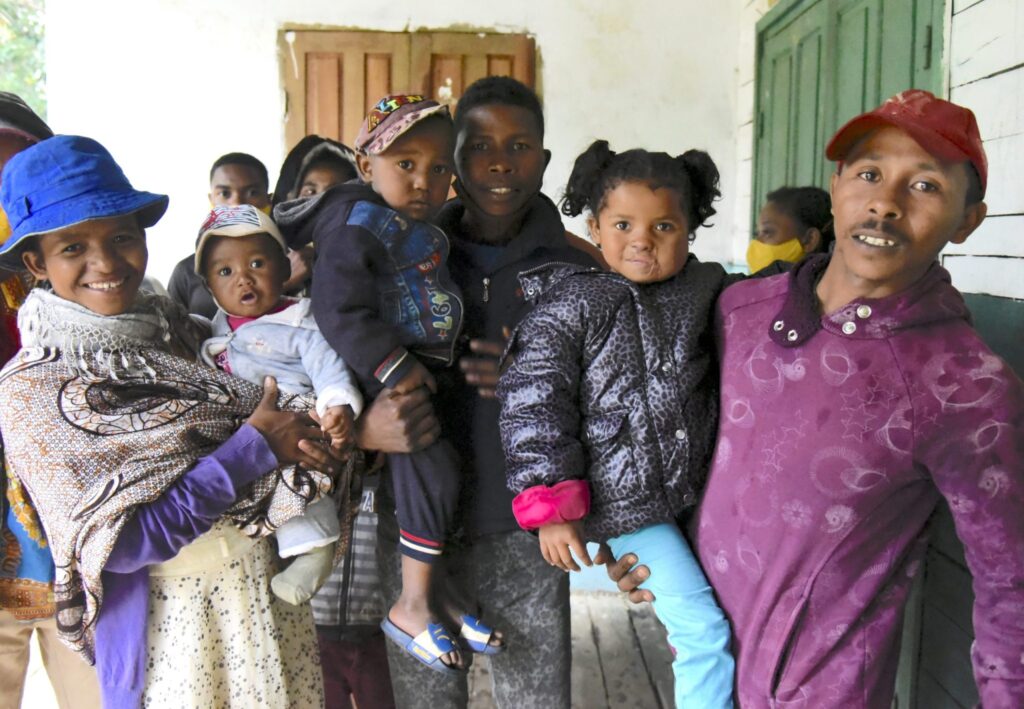
Elisa returns to her family in Ranomafana. On the right, she is held by her father, prosper. On the left Vao, her mother, holds baby Olivier, who was born while Elisa was away. And another family member holds Evariste, their middle son.
The excitement for Elisa and Miora’s homecoming was tangible and contagious across the PIVOT team. In mid-September, anyone who was able abandoned their late-afternoon tasks and donned their masks for an open-air “welcome back” celebration, greeting Elisa’s car as it arrived to Ranomafana from the capital. What was an expected 8-week trip had stretched into more than 8 months.
Elisa’s parents say that it took about a week for her to readjust to life at home, expressing sadness each night for how much she missed her host family and Miora. While in Paris, the two had taken up the nightly ritual of reading bedtime stories together nightly.
Now “every night before going to sleep,” Vao says, “her father and I read her a story. It also helps us because we left school in grade 3 and we are relearning [French] from her now.’’ Just one of many silver linings Elisa’s complex journey spun into existence. According to them, she also “dreams of becoming a doctor when she grows up. […] We will do everything to ensure that she can go as far as possible in her studies.” Cécile and Régis intend to support those dreams of hers as well.
As for Elisa’s parents’ ultimate measure of her success? “We see her happier. She’s not afraid of people looking at her anymore.” And for that, everyone who played a hand in this remarkable journey is celebrating.

Alongside her old classmates, Elisa returns to primary school in Ranomafana in November of 2020 with a newfound confidence.
